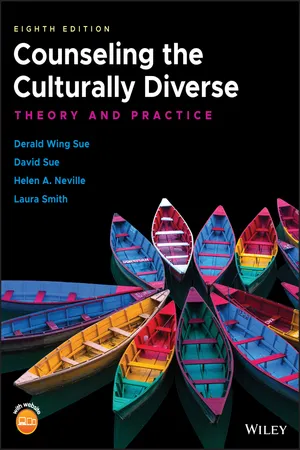
Counseling the Culturally Diverse
Theory and Practice
Derald Wing Sue, David Sue, Helen A. Neville, Laura Smith
- English
- ePUB (mobile friendly)
- Available on iOS & Android
Counseling the Culturally Diverse
Theory and Practice
Derald Wing Sue, David Sue, Helen A. Neville, Laura Smith
About This Book
A brand new, fully updated edition of the most widely-used, frequently-cited, and critically acclaimed multicultural text in the mental health field
This fully revised, 8 th edition of the market-leading textbook on multicultural counseling comprehensively covers the most recent research and theoretical formulations that introduce and analyze emerging important multicultural topical developments. It examines the concept of "cultural humility" as part of the major characteristics of cultural competence in counselor education and practice; roles of white allies in multicultural counseling and in social justice counseling; and the concept of "minority stress" and its implications in work with marginalized populations. The book also reviews and introduces the most recent research on LGBTQ issues, and looks at major research developments in the manifestation, dynamics, and impact of microaggressions.
Chapters in Counseling the Culturally Diverse, 8th Edition have been rewritten so that instructors can use them sequentially or in any order that best suits their course goals. Each begins with an outline of objectives, followed by a real life counseling case vignette, narrative, or contemporary incident that introduces the major themes of the chapter. In-depth discussions of the theory, research, and practice in multicultural counseling follow.
- Completely updated with all new research, critical incidents, and case examples
- Chapters feature an integrative section on "Implications for Clinical Practice, " ending "Summary, " and numerous "Reflection and Discussion Questions"
- Presented in a Vital Source Enhanced format that contains chapter-correlated counseling videos/analysis of cross-racial dyads to facilitate teaching and learning
- Supplemented with an instructor's website that offers a power point deck, exam questions, sample syllabi, and links to other learning resources
- Written with two new coauthors who bring fresh and first-hand innovative approaches to CCD
Counseling the Culturally Diverse, 8th Edition is appropriate for scholars and practitioners who work in the mental health field related to race, ethnicity, culture, and other sociodemographic variables. It is also relevant to social workers and psychiatrists, and for graduate courses in counseling and clinical psychology related to working with culturally diverse populations.
Frequently asked questions
Information
Table of contents
- Cover
- Table of Contents
- Preface
- About the Authors
- SECTION ONE: The Multiple Dimensions of Multicultural Counseling and Therapy
- SECTION TWO: Multicultural Counseling and Specific Populations
- Glossary
- Index
- End User License Agreement